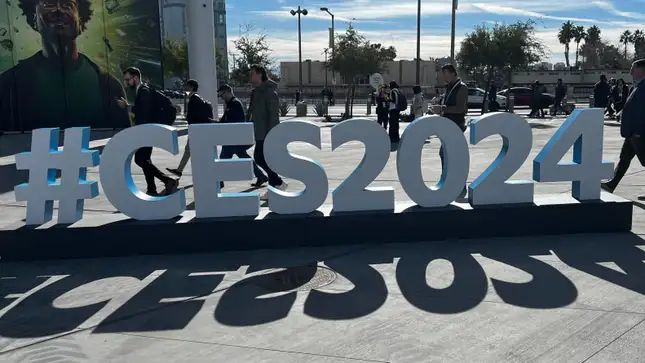Similar to previous years, CES 2024 in Las Vegas will include an array of eye-catching technology, including foldable phones, robots, EVs, and enormous TVs. But AI, the technology that has enthralled millions of people since ChatGPT sprang onto the internet in late 2022, is the foundation of almost every piece of tech on display this year. Imagine C-suite executives hammering away at conference tables in boardrooms, demanding that artificial intelligence (AI) be a pillar of all upcoming products. It’s not unreasonable.
Furthermore, who could blame them? Within five days of its November 30, 2022 launch, ChatGPT had one million users. In contrast, it required three and a half years for Netflix to achieve the same result. After two months, there were reportedly 100 million users on ChatGPT.
J.H. Han, CEO and head of Samsung’s device experience business, stated during the company’s keynote on Monday that artificial intelligence (AI) is altering industries beyond technologies and has the potential to make lives easier and more inclusive for everyone.
This year’s CES was filled with an abundance of AI-enabled goods vying for consumers’ attention, including dog collars, pillows, lights, vacuums, lawnmowers, mirrors, and meat thermometers. Samsung showcased refrigerators with AI vision that can identify food and provide recipe suggestions or alert users when an item’s expiration date is approaching, along with an AI robot called Ballie. AI will also be used by Samsung’s washing machines to understand your routines and recommend cycles.
AI is not a single entity. The foundation of apps like ChatGPT is generative AI. It creates text, images, and even computer code in a matter of seconds by utilizing vast amounts of training data, synthesising information in a manner akin to that of the human brain. Big Tech behemoths like Google and Microsoft are investing billions in this game-changing technology in an attempt to dominate the market. According to McKinsey projections, generative AI could boost the global GDP by 7% and provide up to $4.4 trillion in economic benefits yearly. Hundreds of smaller businesses are emerging in Big Tech’s AI wake, discovering unique uses for generative AI technology for customized applications, such as assisting high school students with their college essays or building online dating profiles.
Product representatives, CEOs, investment bankers, and keynote presenters have all been singing along to AI music at CES 2024. Along with well-known tech companies, the Las Vegas Convention Center is packed with exhibitors hoping to draw in the 130,000 participants of CES as well as the general public curious about how artificial intelligence (AI) will integrate into their lives.
You wouldn’t want to wear boring clothes to the costume party, do you? stated Forrester principal analyst Dipanjan Chatterjee. Everyone will be stating AI there. If you don’t, you’ll most likely appear foolish.
Over 230 million smartphones and PCs that arrive in the US this year are expected to use generative AI in one way or another, according to the Consumer Technology Association, the trade body that organizes CES.
AI is more of an evolution than a revolution for a lot of the products on display at CES 2024. Toasters and refrigerators were “smart” a few years ago when they integrated Samsung Bixby or Amazon Alexa. Although the concepts were intriguing, people’s lives weren’t significantly altered by being able to ask your refrigerator to order milk. At times, voice recognition technology seemed unfinished, as though the intelligence of these smart home assistants was limited by the answers they had already been programmed to know.
However, the next generation of AI can be thought of as smart tech with a new name. Because of the many layers of this conversational technology, you can ask questions and chime in with further details without fear.
For example, you can ask the soon-to-be Volkswagen ID 7 with ChatGPT capabilities to locate a Chinese restaurant nearby. It may direct you to Panda Express, but you may ask for something fancier. Heck, you might ask which of the five upmarket selections has the best selection of seafood. Very ingenious stuff.
Walmart claimed that by utilizing AI, product searches will become more dynamic, enabling customers to see beyond brand names. One can search for “football watch party” and receive recommendations for big-screen TVs, wings, and chips. AI is now also influencing TVs; LG’s high-end OLED models promise AI-powered improvements in picture processing and upscaling.
During Walmart’s Tuesday address, CEO Doug McMillon stated that technology isn’t about it for the sake of technology. When incorporating something like generative AI, the objective should be to pursue technological gains while keeping people in mind along the way.
According to Intel CEO Pat Gelsinger, technology is a tool and its use should be shaped by its users. Artificial Intelligence is merely the most recent advancement in human technology and will soon become a necessity in daily life.
Should you consult with a radiologist who does not employ AI-assisted radiology? Without a doubt not. In an interview with CNBC’s Kristina Partsinevolos during the company’s keynote on Tuesday, Gelsinger stated, “Just like you wouldn’t have gone to a finance guy who didn’t use a spreadsheet.”
Anyway, don’t expect an existential crisis from a $3,500 AI-powered toaster. The majority of items showcased at CES are, in fact, typically conceptual in nature, showcasing possibilities that are rarely realized in the market, at least not in the near future. Nonetheless, certain features do make their way to customers, gradually altering the tech environment.
“What [brands] don’t want to do is go back home and compete on price,” Chatterjee explained. Rather, he asserted, companies derive greater satisfaction from providing things you will consistently depend on and from observing your usage patterns over time.
“You’re basically hooked.”








